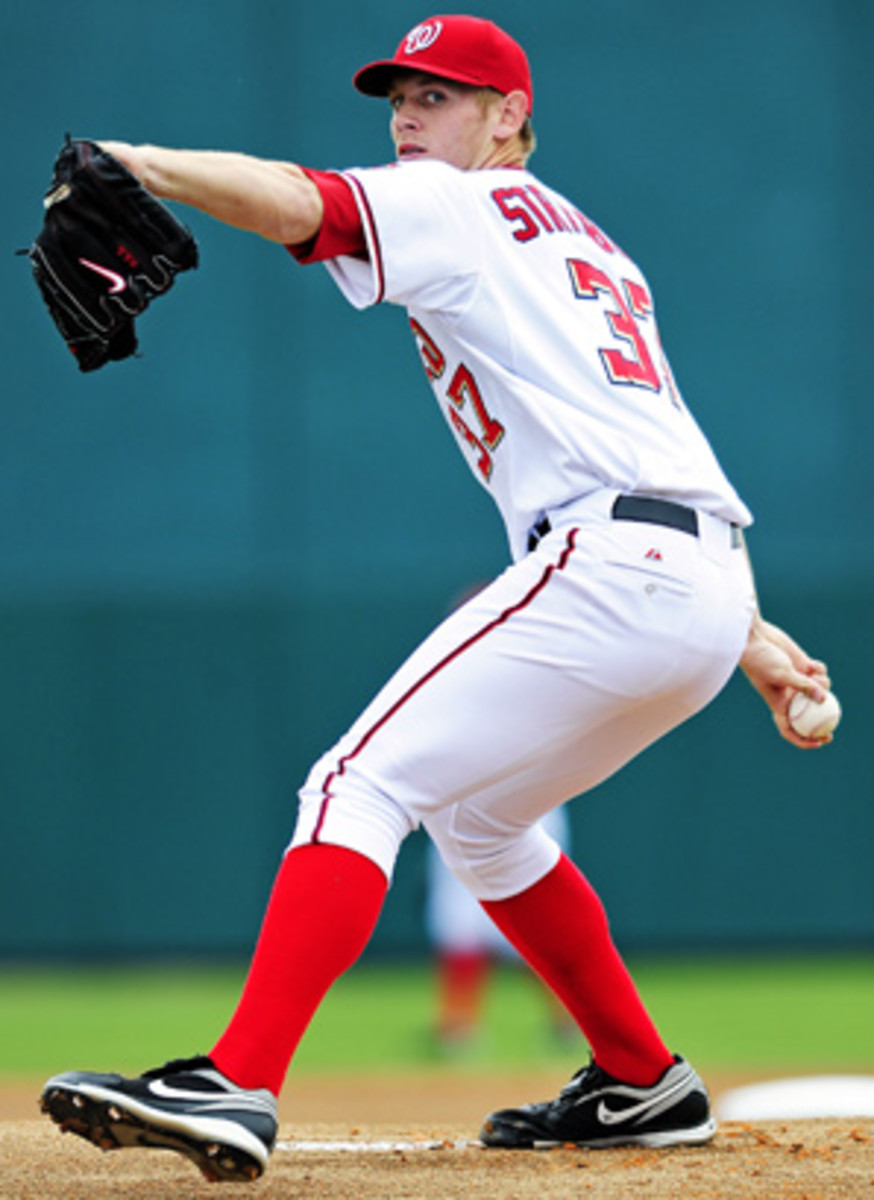Nationals should learn from history and leave Strasburg alone
"Oh, crap," says Ed Hearn.
The words come automatically. The dismay is legitimate. I have just informed the long-retired major league catcher that the Washington Nationals seem to think Stephen Strasburg, as perfect a pitching prospect as the game has seen in some time, isn't quite perfect enough. "They want to make him more efficient," I tell Hearn, a man I've known for years. "So he doesn't waste pitches."
That sentiment was expressed by Washington manager Jim Riggelman a few days ago. "Don't expect to see double-digit strikeouts too often," he told the Washington Post. "He's going to be more of a ground ball pitcher, like Ubaldo Jimenez, than a strikeout pitcher like Roger Clemens or Kerry Wood. It's better to get three outs on 12 pitches than three strikeouts on 18."
Hearn is stunned. He has seen a ghost, and it is standing in front of him in his Overland Park, Kans., home. The apparition is a lanky kid, 6-foot-2, maybe 175 pounds, with elastic arms and a crooked gold front tooth. He is a perfect physical specimen -- long and lean and blessed with a Ford Mustang-powered fastball. He is unshakable, and unbeatable. "Dwight Gooden," says Hearn. "They said the same thing about Doc way back when. The exact same thing."
In the summer of 1983, Hearn was a catcher with the Lynchburg Mets of the Class A Carolina League. The team was loaded with future Major League arms, from Jay Tibbs and Wes Gardner to Calvin Schiraldi and DeWayne Vaughn. Though only 22, Hearn was already in his sixth year of organized baseball. He had seen his fair share of power arms (Kevin Gross was a teammate with the Reading Phillies one season earlier) and was pretty certain nothing in baseball could take him by surprise.
Then he squatted behind the plate and received the Uzi blast that was the 18-year-old Gooden's four-seam fastball.
"I could turn to the hitter and say, 'Here comes Doc's heater,' and he wouldn't be able to hit it," says Hearn. "He blew the ball by people, and it never looked especially hard. His fastball had a very natural movement. Dwight had that gift." Indeed, in one of the great seasons in minor league baseball history, Gooden went 19-4 in 27 starts, with a 2.54 ERA and 300 strikeouts over 191 innings.
Gooden debuted with the Mets the following year, and in 1985 established himself as an official heir to the Koufax throne, winning the NL Cy Young Award with a 24-4 record and 1.53 ERA. He was supposed to be the world's dominant ace for the ensuing decade, the reincarnation of Cy Young and Walter Johnson morphed into one. When people cite Strasburg as the most hyped young pitcher of alltime, they make the mistake of overlooking the deified Dr. K.
Before Gooden could take the next step toward legend, however, the Mets committed an unforgivable faux pas: They tinkered. GM Frank Cashen, one of the era's best evaluators of talent, worried about Gooden destroying his power arm, a la Mark Prior two decades later. Mel Stottlemyre, the generally savvy pitching coach, thought Gooden could be even better with a second fastball -- a two-seamer to dip down and result in more groundouts.
Hence, during spring training before the Mets' world-championship 1986 season, Stottlemyre spent hours upon hours tutoring Gooden on the intricacies of the two-seam grip. "I always thought they should have left Doc alone," Gary Carter, the Mets star catcher, once told me. "Mel thought teaching him a third pitch would be to his advantage, but he didn't need it. He needed someone to say, 'Hey, you've been successful. Just keep going at it.' But they didn't."
The results speak for themselves. In 1985, Gooden was the elite arm in all of baseball. In 1986, he was merely good -- a 17-6 pitcher whose ERA rose by more than a run per game and whose strikeouts dropped precipitously. "Looking back, you never knew with Dwight whether some of that was related to his [well-documented] substance abuse issues," says Hearn. "But I caught Doc, and I can tell you he wasn't the same after being forced to throw a pitch he was never comfortable with.
"I don't know this Strasburg kid, and all I've watched were the highlights on TV. But if I'm Washington, I leave him alone and let his talent shine. Because I've seen what can happen when you mess with a great thing.
"It's not pretty."






